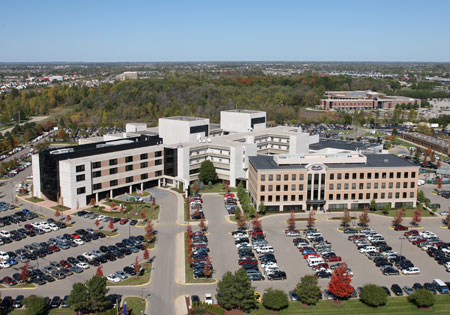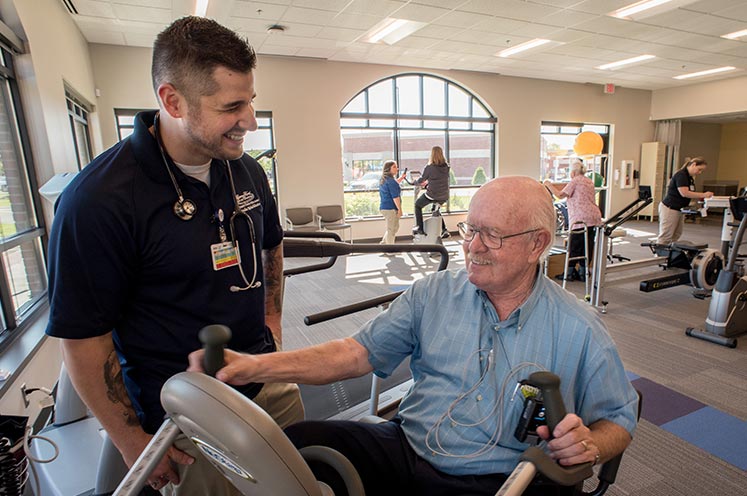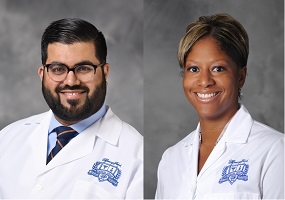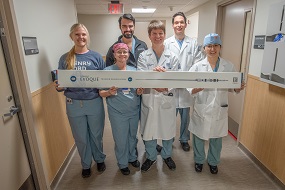
Cardiac Rehabilitation
"The Confidence Course"
You’ve just been discharged from the hospital after a serious issue with your heart, and you’re a little apprehensive about what happens next.
Henry Ford’s Cardiac Rehabilitation program, also known as “The Confidence Course,” is designed for patients like you who were recently discharged from the hospital following a heart attack, coronary angioplasty or heart surgery, or with a condition like stable angina and heart failure.
The primary goal for cardiac rehabilitation is to help you restore optimal physical, emotional, and economic wellbeing through education and exercise.
Physicians, clinical exercise physiologists, registered dietitians, registered nurses and behavioral health specialists work in cooperation with your doctor to provide structured education and individualized ECG (electrocardiograph) monitored exercise.
This program, designed for you, not only helps improve your heart and muscular function, but also reduces your risk of suffering another heart problem in the future. Patients recovering from heart problems typically attend three sessions per week for up to 12 weeks.
What to Expect from Your Cardiac Rehab Appointment

What kinds of rehab are available?
Here’s how your cardiac rehabilitation will proceed:
- Phase I cardiac rehabilitation begins in the hospital as you recover from your heart-related problems. You’ll receive information about nutrition, exercise and other aspects of a healthy recovery and perform moderate physical activities.
- Phase II cardiac rehabilitation provides outpatient education to improve your cardiac health and includes individualized ECG (electrocardiograph)-monitored and medically supervised exercise programs.
- Phase III cardiac rehabilitation, Henry Ford’s PREVENT program (prevention through exercise and education), establishes heart-healthy lifestyles for patients like you by combining medically supervised exercise with education for patients with all types of health concerns.
Medicare and Health Alliance Plan (HAP) usually cover between 80 and 100 percent of the program’s cost. Other health insurers may cover between 20 and 100 percent.
Show me


Henry Ford Health Cardiologists Lead National Study on Novel Bleeding Monitoring System
Novel technology monitors and lowers bleeding complications in patients undergoing heart procedures.

Young Detroit Mother Thanks DFD First Responders, Henry Ford Health Care Team at Emotional ‘Second Birthday’

Henry Ford Health Heart Failure Patient First in Michigan to Receive Breakthrough Device

Testing C-reactive Protein Levels: What It Means For Your Heart Health
Testing C-reactive protein (CRP) levels can provide clues to chronic inflammatory processes, like heart disease or autoimmune diseases, that can put stress on your body’s vascular system over time.

How Women Can Support Each Other's Heart Health
Women are at a greater risk of developing heart disease and related risk factors. However, staying informed and advocating for the health of others are your greatest tools for lowering your risk.

How Microplastics Can Affect Your Heart Health
Microplastics can hide inside arteries—and their presence may increase the risk of heart attack and stroke. Can you reduce your risk?

How To Get Started On A Heart Smart Diet
The path to a healthier lifestyle can be hard to follow if you don’t know where to start. A registered dietitian shares how to take the first steps toward a heart-healthy diet.
.svg?iar=0&hash=F6049510E33E4E6D8196C26CCC0A64A4)

/hfh-logo-main--white.svg?iar=0&hash=ED491CBFADFB7670FAE94559C98D7798)

